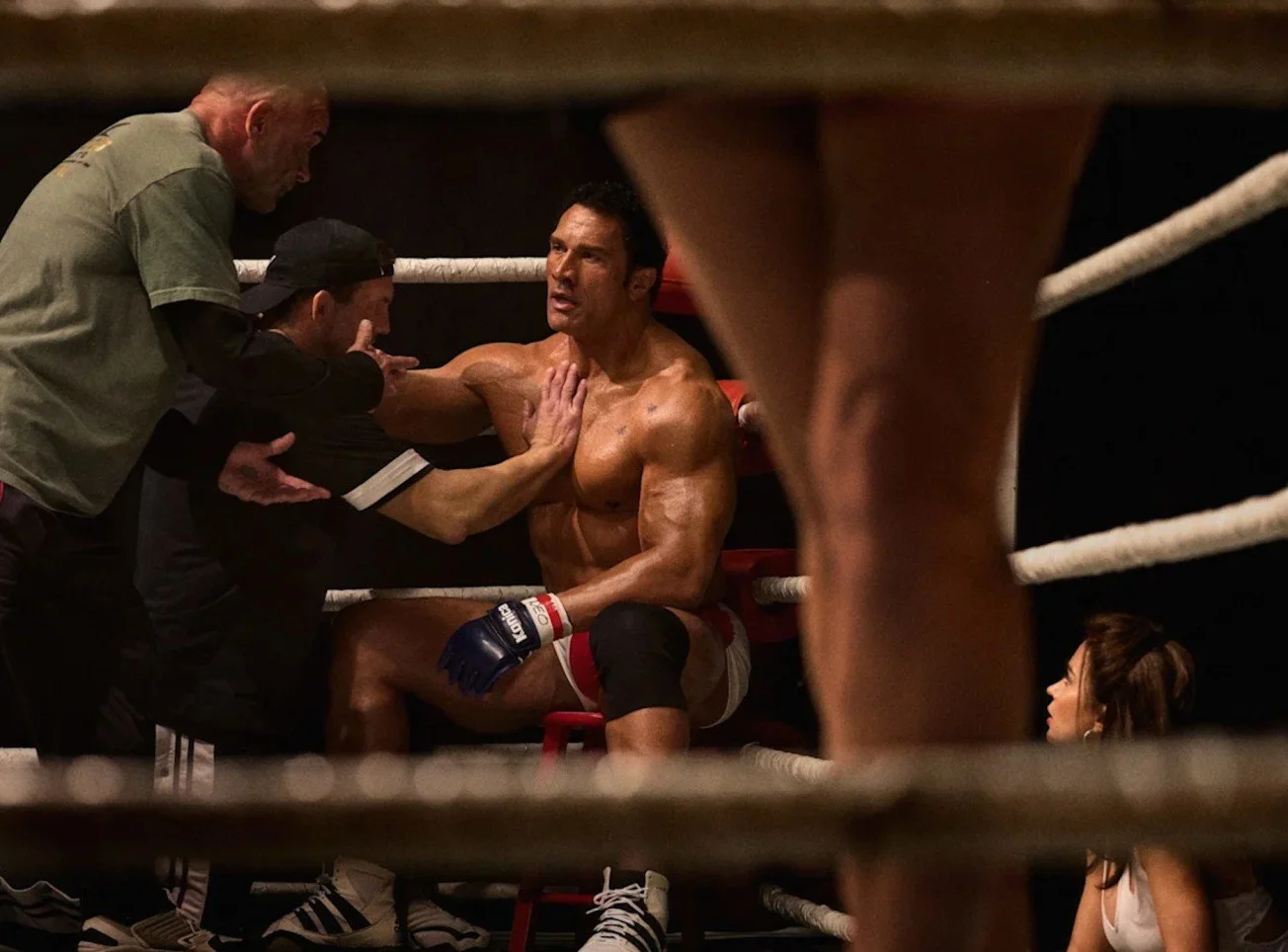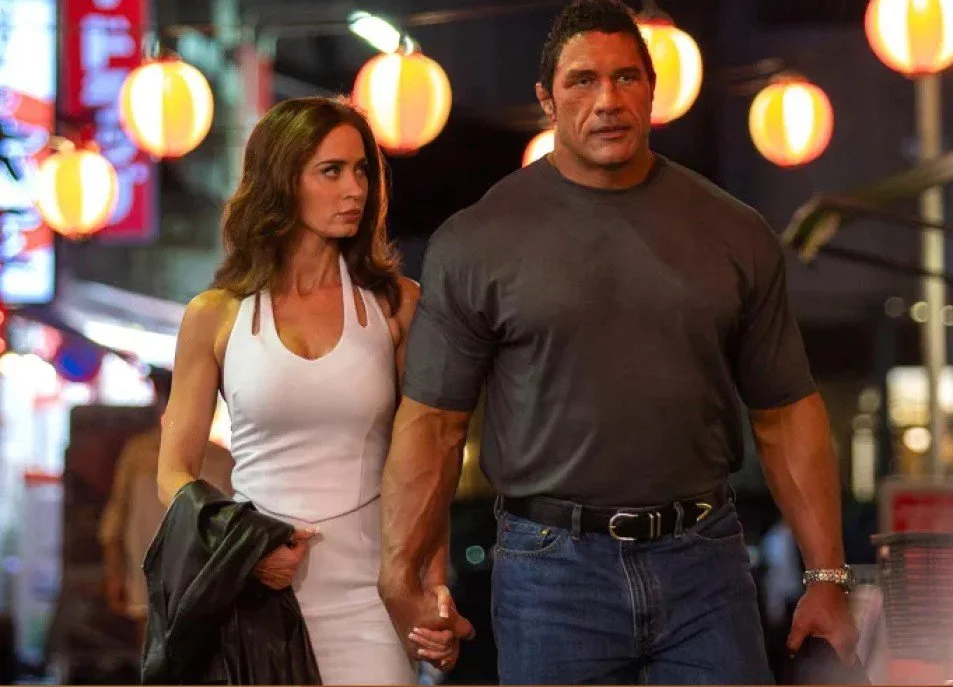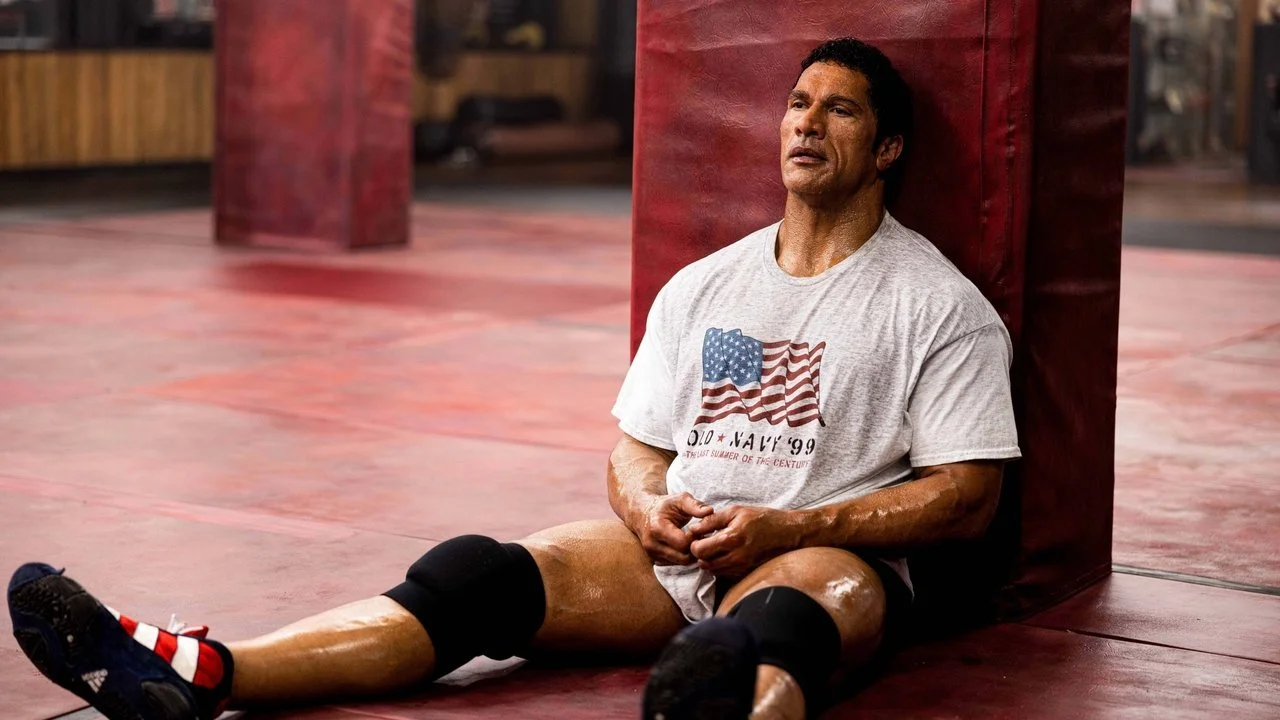Directed and written by: Benny Safdie
Starring: Dwayne Johnson, Emily Blunt, and Ryan Bader
Runtime: 123 minutes
Despite Johnson’s and Blunt’s solid performances, ‘The Smashing Machine’ swings and misses
“Winning is the best feeling there is.” - Mark Kerr (Dwayne Johnson)
Mark Kerr knows winning.
He was an All-American wrestler at Syracuse University. When director/writer Benny Safdie’s film begins, Mark is a few years removed from his college days, as this 6’ 1” 255-pound colossus takes his grappling talents to professional mixed martial arts in the squared circle. While Mark pummels his opponent, he also narrates his feelings about this new sport, including sensing fear in his opposition and his time in the ring being “magical.”
However, Mark doesn’t obnoxiously yell, scream, or preach his feelings into a microphone, like the late Hulk Hogan during a WWE interview or Kansas City Chief Travis Kelce after a Super Bowl win. With a matter-of-fact, soft-spoken cadence, Mark (almost) always brings a gentle giant persona when speaking. He’s either revealing his natural, instinctive soothing side or, perhaps, wanting to be more accessible to John or Jane Q. Public, due to his intimidating muscle-bound physique and the occasional contusions and cuts on his face after a match.
Safdie’s biopic “The Smashing Machine” depicts Kerr’s fighting career over a few years, beginning in 1997, as UFC experiences its growing pains. UFC has promoted 749 events as of October 4, 2025, with the first one kicking off in 1993. While UFC experiences in recent years enjoy rock concert pomp and circumstance, those early days, obviously, didn’t have the breadth of ballyhoo.
This movie lives in Mark’s era, as Safdie’s film features a blue-collar daily grind, with a lunch pail filled with protein smoothies and painkillers.
Except for his time in the ring and cage, Kerr’s free-from-fanfare life consists of training on his own (or with his girlfriend, Dawn (Emily Blunt)), preparing meals at home, and sitting on the couch. Most of his homelife, however, is spent arguing with Dawn, a frustrating antagonist who does not seem to possess the skillsets of a supportive partner or the will to develop them.
Dawn isn’t the understanding and encouraging Adrian Pennino/Balboa (Talia Shire) from the “Rocky” movies but rather Ginger McKenna (Sharon Stone), Sam Rothstein’s (Robert De Niro) troublemaking and inflammatory demon of a spouse in “Casino” (1995).
Mark requires Herculean drive and focus in all phases of life to become an MMA champion, but when adversity strikes during a competition and also with his health (through coping with pain), Dawn and he constantly miscommunicate.
This bickering couple frequently explains – in no uncertain terms - their individual needs to each other, but neither can satisfy them, which results in exasperation and eventually infuriation by both parties.
Hence, the necessity for peace in Mark’s personal life is swept up and smashed by Hurricane Dawn, and living with this turbulent weather system can easily forecast misfortune during in-ring/in-cage combat.
Granted, Kerr contributes to the domestic storm with his OCD tendencies towards meal preparation and household happenings, such as complaining about the cat lying on the couch and Dawn not fulfilling her tree-trimming duties.
Mark’s biggest individual complaint, however, is Dawn’s drinking, when he simultaneously attempts to wean off painkillers, but we only see her drinking once with a friend. She takes a few aspirin to nurse a hangover on a single occasion. So, her association with alcohol doesn’t resonate thematically within the confines of a 123-minute picture.
We’re told she has a drinking problem, but it’s not adequately portrayed on-screen.
Additionally, Mark’s addiction to opiates rises as a central plot point, however, we are only witnesses to one instance of the man using the drug. There are no other signs of abuse other than suddenly, without warning, Mark ends up in the hospital with his colleague, Mark Coleman (Ryan Bader), comforting him while he weeps. Kerr, for some reason in this scene, has missing front teeth, but Safdie doesn’t explain this odd visual, as Mark has all his pearly whites in his next on-screen moment.
What is happening here?
Our lead is also forced to live in a rehab facility, but the movie only features him walking in and walking out without the potentially thought-provoking and emotional testimonials and physical struggles endured on the inside.
It seems that “The Smashing Machine” had another 45 minutes of valuable footage left on the cutting room floor that would fill in these gaps and strengthen the connections that Safdie wishes to convey.
Then again, with very little time Mark actually spends in matches (perhaps 15 minutes; it’s difficult to exactly say), another three-quarters of an hour of domestic and addiction messes would further exacerbate the disparity between the physical pugilism and the plights outside it.
As far as the in-ring camerawork, it’s unremarkable and (mostly, frequently, or perhaps entirely) filmed from outside the ropes from a spectator’s perspective. It feels distant, and the nondescript, unknown, and unseen fight announcers’ commonplace cadence and commentary don’t add to the experience.
Where’s the late Fred Willard when you need him?
Still, Johnson absolutely sells the corporeal confrontations with his decades of wrestling experience under his championship belts.
Also note that Johnson is in incredible shape for the part, with his inhuman brawn seemingly capable of crushing bricks with his bare hands. He obviously worked hard in the gym and in rehearsals. With the nifty but subtle facial prosthetics and his commitment to portraying the (mostly) soft-spoken Kerr, Johnson is entirely believable as The Smashing Machine (and so is Blunt as Dawn).
The famed WWE superstar at some point, after the initial curiosity, melds into Kerr, a grappler grappling with everyday opponents - namely, his relationship, drugs, one example of money concerns (that is never mentioned again), and fighting setbacks – when trying to win in the game of life.
Winning may be the best feeling there is, but the pedestrian, choppy screenplay and questionable editing and production decisions ruin any chance for victory.
Unfortunately, “The Smashing Machine” swings and misses.
Jeff’s ranking
2/4 stars















